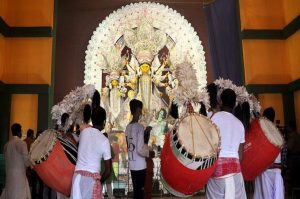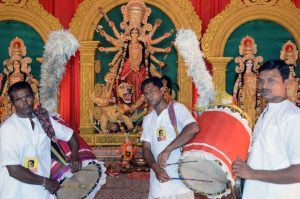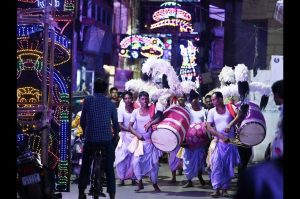Dhakis Queue Up for ID Proofs: As the festive season approaches, the rhythmic beats of the dhak are once again set to travel far beyond the borders of Bengal. Yet, before they can showcase their centuries-old tradition of drumming in temples and pandals across India, many dhakis are facing an unusual hurdle — the demand for official identity documents. Local administrations, law enforcement agencies, and organizers outside Bengal have begun insisting that the drummers carry valid identification to ensure smooth travel and security clearance.

For the dhakis, who are often from small villages in districts like Nadia, Murshidabad, Burdwan, and North 24 Parganas, this requirement is proving to be a new cultural and bureaucratic test. Traditionally, they have been recognized solely by their craft — the thundering yet soulful beats of their instruments during Durga Puja, Kali Puja, and weddings. But in a modern India that increasingly demands documentation, their lack of voter cards, Aadhaar, or other ID proofs is creating challenges for participation in events beyond their state.
Dhakis Queue Up for ID Proofs: Tradition Meets Bureaucracy
For generations, dhakis have been central to Bengal’s religious and social identity. Their music heralds the arrival of Durga during autumn, evokes nostalgia at family ceremonies, and creates an unmistakable spiritual atmosphere in puja pandals. Many have been performing since their teenage years, carrying forward a family profession that rarely required literacy or paperwork.
Now, however, railway authorities, police checkpoints, and event organizers in other states are pressing for identity verification to allow smooth passage of groups. This has led to long queues outside local administrative offices, where dhakis — dressed in simple lungis and gamchas — are waiting patiently to apply for Aadhaar cards, voter IDs, or renew existing documents.


One dhaki from Nadia, Ratan Das, explained: “We are used to carrying only our dhak and clothes when we leave Bengal for the season. Now we are being told that without Aadhaar or voter card, it will be difficult to board trains in groups or even enter the venues. Many of us never felt the need for documents before, but now it has become urgent.”
Rising Demand Outside Bengal
The popularity of Bengal’s dhakis has grown significantly over the past two decades. Today, puja committees in Delhi, Mumbai, Bengaluru, Hyderabad, and even abroad seek out these drummers to bring authenticity to their celebrations. Their beats are considered irreplaceable, lending pujas outside Bengal the same grandeur as those in Kolkata or rural districts.
According to cultural organizers, at least 2,000–3,000 dhakis travel out of Bengal every year during the Durga Puja season. Some groups even secure international invitations, particularly in pujas organized by Bengali diaspora in London, New Jersey, and Singapore. For international travel, passports are a necessity — but for many who have never even opened a bank account, this becomes nearly impossible without Aadhaar or PAN cards.
The pressure for IDs, therefore, is not only administrative but also economic. Without proper papers, drummers risk losing lucrative assignments outside Bengal, which often pay several times more than what they earn in local pandals.
Challenges Faced by Dhakis
Despite the urgency, acquiring ID proof is not easy for many drummers. A large number belong to marginalized communities, live below the poverty line, and lack fixed residential addresses. Some are seasonal workers who migrate for agricultural labor, while others live in temporary village homes that lack proper documentation.


Local NGOs have stepped in to help dhakis fill out forms, arrange for photographs, and liaise with government offices. Still, bureaucratic delays often result in some missing their deadlines to travel.
As another dhaki, Shambhu Mondal, shared: “Our names were misspelled in voter lists, and now they want us to correct them. Some of us never had school certificates. We only know how to play the dhak, not how to manage these papers.”
Cultural Heritage at Stake
Scholars and cultural historians argue that this situation highlights a broader issue: the invisibility of traditional artists within official frameworks. Despite their immense contribution to India’s intangible cultural heritage, dhakis remain outside welfare schemes, pension programs, or cultural grants. The insistence on ID proofs has exposed this gap.
According to the Sangeet Natak Akademi, dhakis fall under the category of folk performing artists, yet very few have benefited from state or central government schemes. Many cultural activists are now urging that simplified documentation drives be held in rural Bengal to ensure these artists can preserve their livelihood.
Read more on the role of folk artists in Indian heritage.
Safety and Security Concerns
Officials defending the ID-proof requirement argue that it is necessary for ensuring safety during mass gatherings. Large festivals across India now face stricter policing due to security threats, overcrowding risks, and the need to manage migrant laborers. Having IDs helps authorities verify the identities of traveling groups, prevent illegal activities, and provide emergency assistance if required.
For example, in cities like Delhi and Bengaluru, where hundreds of dhakis arrive each year, puja committees must submit lists of performers to local police. Without proper ID, entry permissions become difficult.
Economic Lifeline for Villages
The seasonal migration of dhakis is not merely about music; it is an economic lifeline. In many villages, agriculture no longer sustains families due to declining yields and land fragmentation. The income from performing at pujas and weddings supplements their livelihood and pays for essentials like school fees, healthcare, and food.
Some groups earn between ₹20,000 to ₹50,000 for a few days of playing outside Bengal, compared to only a fraction of that in rural areas. Missing out on these opportunities due to lack of documentation could push entire families into financial distress.
Calls for Policy Intervention
Cultural activists and social workers have appealed to the state government to create a special documentation and welfare scheme for dhakis. Suggestions include:
- Mobile Aadhaar camps in rural villages during pre-festive months.
- Artist ID cards issued by the state culture department, recognized nationwide.
- Travel assistance schemes for folk performers, similar to subsidies given to athletes or cultural delegations.
- Inclusion in social security programs for old-age pension, healthcare, and insurance.
Unless such steps are taken, experts warn, Bengal risks losing an integral part of its cultural heritage as younger generations abandon the profession due to uncertainty and bureaucratic obstacles.
A Struggle for Recognition
At its heart, the dhakis’ queue for ID proofs is symbolic of a larger struggle — the recognition of traditional artists in a rapidly modernizing, document-driven society. Their beats have announced the arrival of the goddess for centuries, uniting communities across castes and classes. Yet, without timely intervention, these voices may fade into silence outside Bengal’s borders.
For now, many dhakis are braving the long queues at government offices, their calloused fingers waiting to once again strike the stretched leather of their dhaks. Their hope is simple — that when the trains leave Bengal carrying festive spirit, they too can be on board, identity papers in hand, to keep the tradition alive.
Also read: Home | Channel 6 Network – Latest News, Breaking Updates: Politics, Business, Tech & More

